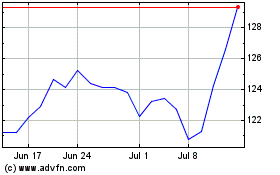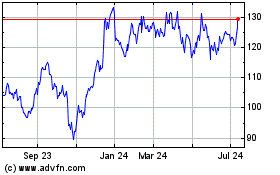Private-Equity Stocks Fall Back to Earth After Rapid Gains
March 16 2020 - 2:34PM
Dow Jones News
By William Louch
Large share-price gains posted by some of the world's biggest
private-equity firms over the past 18 months all but vanished over
the past week.
Shares in alternative asset managers, including Blackstone Group
Inc., Carlyle Group Inc. and Apollo Global Management Inc. have
been hit by a broad market selloff, with the stocks down 25%, 28%
and 22%, respectively, from the March 6 close as of Monday
afternoon.
The declines in shares of big buyout firms have outstripped the
broader market, even as U.S. stocks recorded their worst one-day
performance Thursday since Black Monday in October 1987. Thursday's
dive brought the market's 11-year bull run to an abrupt end.
Over the first four days of last week, two major U.S. market
barometers, the Dow Jones Industrial Average and the S&P 500
index dropped 18% and 16.5%, respectively. Both indexes rebounded
Friday, with the Dow posting a nearly 9.4% gain and the S&P 500
rising 9.3%. However, major stock indexes declined sharply again
Monday, after the U.S. Federal Reserve announced it would slash
interest rates to near zero, among other actions aimed at
mitigating expected economic shocks from the spread of the novel
coronavirus.
The sharp fall in private-equity stocks partly reflects broader
macroeconomic concerns as a reaction to the rapid rises in their
share prices over the past 12 to 18 months, said Patrick Davitt, an
analyst at Autonomous Research USA. But it also shows some of the
risks of converting publicly traded partnerships to conventional
corporations, which opened their shares to a broad array of
indexes, mutual funds and exchange-traded funds.
"The stocks have outperformed so well over the past year with
the C-Corp trade," Mr. Davitt said. "There was probably already a
view getting into the market that maybe it was time to take a
breather."
Publicly traded private-equity houses saw their share prices
soar over the roughly 18 months through February, boosted largely
by the decision to abandon partnership structures and become
corporations, a move that helped expand who could buy the stocks.
Index and mutual funds typically don't invest in partnership
structures.
Historically, publicly traded private-equity firms have
complained that stock markets didn't accurately value their
performance. Private-equity firms earn steady fees from investors
from managing assets and share a slice of profits made on
successful investments -- a lucrative but unreliable source of
gains.
After Blackstone announced its switch to a corporation in April
last year, its shares rose fast, nearly doubling from around $35 to
an intraday high of $64.97 last month. The conversion took effect
July 1. The fall last week took the stock back down to near where
it was before the conversion.
Investors have other concerns though. The rapid expansion of
many of the publicly traded buyout shops into private credit over
the past decade has stoked fears among some investors, Mr. Davitt
said, mainly due to the lack of visibility around the performance
of their debt investments.
As banks pulled back from lending to riskier businesses in the
wake of the financial crisis more than a decade ago, private-equity
firms stepped in.
The likes of Blackstone, with its GSO unit; Apollo; KKR; and
Carlyle have all raised billions of dollars to lend to small and
midsize companies. GSO, for instance, manages $144 billion in
assets; substantially more than the $90 billion managed by
Blackstone's buyout arm.
Apollo shares were at $31.55 on Monday, down 39% from a closing
peak of $52.14 on Jan. 23. KKR shares were at $23, which is 32%
below their $33.93 closing peak on Feb. 19, and Carlyle's were
trading at $18.92, down 45% from the Jan. 23 close of $34.45.
"Credit is top of mind. They have all become quite big in the
shadow banking market, and that's where the growth has come since
the financial crisis in" assets under management, Mr. Davitt said.
"The visibility on the positions there is very, very low relative
to what we have in their private-equity or real estate
businesses."
A prolonged economic downturn could provide more opportunities
for firms to purchase assets at more attractive prices, at a time
when deal valuations are at record highs. If this happens, it is
likely to make private-equity stocks all the more tempting to
investors in the future.
"There are probably lots of large businesses out there that they
have had their eye on but maybe they didn't want to buy because of
valuations and/or the company didn't want to sell. Now the economy
is less certain and pricing is lower, you might start to see more
transactions," Mr. Davitt said. "I think you will see more interest
in stepping in and buying the stocks of private-equity firms on the
view that they are going to be putting more money to work at lower
valuations."
Write to William Louch at william.louch@wsj.com
(END) Dow Jones Newswires
March 16, 2020 14:19 ET (18:19 GMT)
Copyright (c) 2020 Dow Jones & Company, Inc.
Blackstone (NYSE:BX)
Historical Stock Chart
From Mar 2024 to Apr 2024

Blackstone (NYSE:BX)
Historical Stock Chart
From Apr 2023 to Apr 2024
